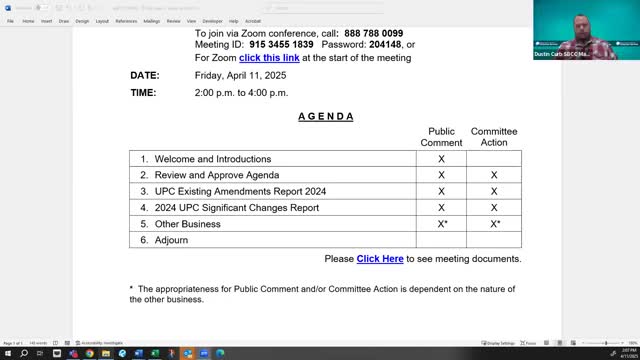Building Code Council committee forwards 2024 Uniform Plumbing Code reports to council, elects chair pro tem
Get AI-powered insights, summaries, and transcripts
Subscribe
Summary
The Building Code Council MVPE committee voted April 11 to forward two reports — an existing amendments review and a significant-changes review of the 2024 Uniform Plumbing Code — to the full council for review and to open the code-change proposal window. The committee also elected Ben O'Meara chair pro tem for the meeting.
The Building Code Council’s Mechanical/Ventilation/Plumbing/Energy (MVPE) committee on April 11 voted to forward two staff-tag reports on the 2024 Uniform Plumbing Code (UPC) — an existing-amendments review and a significant-changes review — to the full council for consideration, clearing the way for the council to open the code-change proposal window.
The committee also nominated and elected Ben O'Meara as chair pro tem for the meeting before taking the votes on the UPC reports.
Why it matters: forwarding these reports to the council will allow the formal code-change proposal period to open. That process can lead to proposed amendments or state-specific changes to the UPC that affect plumbing requirements across Washington state, including shower and fixture flow limits, backflow-prevention rules and which model-code appendices and reference standards the state adopts.
Staff framed the meeting as a technical review. "We are here today to move an existing amendments report and a, significant changes report for the, Uniform Plumbing Code to the council," said Dustin, a staff member leading the session. Brandon, the code specialist who led the tag review, walked committee members through the two documents and paused at flagged sections for discussion.
Committee members and tag participants raised several technical concerns that the reports flag for either retention of current Washington state amendments or for later code-change proposals. Larry, a tag participant, questioned a proposed change to a backflow-prevention table and said the model-code text as drafted would not meet Washington’s current backflow protection requirements: "I don't think that meets... That has to be, an RP there and 2 check valves with a vent in between," he said, arguing the device must be a testable reduced-pressure (RP) assembly and that materials need to meet state approval.
Other discussions centered on:
- Formatting and transparency: committee members asked staff to fix the draft’s formatting key so state-amended text (intended to appear in red) is visible in the packet before the council sees the draft. Brandon agreed to update the draft to show the state-amended language.
- Shower and fixture flow language: several participants flagged unclear model-code language on maximum flow rates (for example, whether a 2.5 gallons-per-minute limit applies per sprayhead or per fixture), and the tag marked that section as a likely candidate for a code-change proposal to clarify application and counting rules.
- Reference standards and appendices: the group discussed many updated or added reference standards in the 2024 UPC and noted that several model-code sections or appendices are not adopted in Washington. Staff and the tag recommended flagging the reference-standards table for further review; doing so would require extra editorial work to correlate state amendments with updated standard numbers. The tag recommended retaining the state-adopted appendices A, B, I and M and generally recommended not adopting several newly added appendices unless a formal proposal is submitted.
- Process and next steps: the tag’s role in this phase is review and flagging. Committee members and staff clarified that individual tag members or members of the public can submit code-change proposals once the council opens the proposal window; in some cases tag members may prepare proposals on behalf of the tag.
Formal actions and votes taken during the meeting included the following (voice votes):
- Election of a chair pro tem for the meeting: Ben O'Meara was nominated, accepted and approved by voice vote.
- Motion to forward the existing-amendments review for the 2024 UPC to the council: moved by Katie Sheehan and seconded by Joe (last name not specified in the transcript); voice vote recorded as "aye" and the motion passed.
- Motion to forward the significant-changes review for the 2024 UPC to the council: moved by Justin Bourgo (motion carried by voice vote; second not specified in the record).
Committee members emphasized that some of the flagged items will need code-change proposals to resolve conflicts between the 2024 UPC model language and existing Washington state amendments or statutory/regulatory requirements. Staff committed to correcting formatting issues in the draft reports and to clarifying which sections the state does not adopt before the packet goes to the council.
The meeting closed after other-business items; staff noted the substantial amount of review work completed in a short timeframe and thanked tag members for their efforts.
Ending: The committee forwarded both reports to the Building Code Council for action next week, which — if the council opens the proposal window — will allow stakeholders and tag members to submit formal code-change proposals during the public window.
